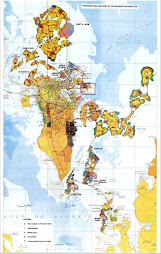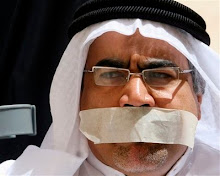Bahrain Courts Investors as Link to Mideast-Wall Street Journal
Political Discontent And Rival Entreaties Make Pitch Difficult
By ANDREW CRITCHLOW
January 24, 2008
DAVOS, Switzerland --
Bahrain's Sunni-Muslim ruling family is putting on a charm offensive at this week's World Economic Forum. But the effort risks falling flat as Western business cozies up to Bahrain's richer neighbors in Qatar and the United Arab Emirates.Executives and government officials from the tiny Gulf archipelago led by Crown Prince Salman bin Hamad al Khalifa, backed by an expensive advertising campaign, hope to persuade international investors that Bahrain is the steppingstone to the booming economies of the Middle East.
But dwindling oil revenue, domestic political discord and the more aggressive efforts of some of Bahrain's Gulf rivals make that pitch a hard sell.
The Khalifa clan, which holds most of the major government positions and controls much of the country's wealth, is under threat from discontent within the kingdom's majority Shiite Muslim population. It enjoys few of the economic and political privileges of Sunnis.Last month, tensions spilled over in Manama, the capital, when Bahraini security forces used tear gas and rubber bullets to disperse Shiite Muslim rioters. That resulted in multiple arrests and the reported death of one protester.
Unease between the kingdom's Sunni rulers and the Shiite majority is an important point for Saudi Arabia and the U.S., which bases its Gulf Fifth Fleet in Bahrain.
Saudi Arabia, which supports Bahrain economically with the supply of oil and gas to compensate for declining stocks, is linked to Bahrain via a 25-kilometer-long causeway. Riyadh's concern is that trouble among Bahrain's Shiites might resonate across the border among Saudi Arabia's own Shiite population, which congregates in the country's oil-rich eastern region.
So far, the U.S. has been reluctant to disturb the status quo with Bahrain's rulers for fear of losing basing rights for the American fleet, despite Washington's desire to encourage greater representation for Shiites in the wider Middle East.Bahrain has worked hard to diversify its economy in readiness for its oil and gas wells running dry in the next 15 years.
Almost $300 million was spent four years ago building a race circuit so that Manama could host the Persian Gulf's first Formula 1 Grand Prix.More importantly, like neighboring Qatar and Dubai, Bahrain is constructing a financial center to lure the world's largest banks.But despite the Bahraini hoopla, delegates to the World Economic Forum in Davos may come away with the feeling this is too little, too late.Bahrain is losing out to the U.A.E. sheikdom of Dubai, in a battle to attract foreign investment and local money that has spurred a $300 billion real-estate boom in the semiautonomous city state.
The Bahrain Financial Habour, a $1.5 billion banking and financial zone, may fail as banks such as HSBC, Morgan Stanley and Goldman Sachs prefer to open larger bases in the competing Dubai International Financial Center.Even the much-publicized Formula 1 Grand Prix, intended to attract tourism and showcase Bahrain as a benign Arab monarchy, looks under threat, with Abu Dhabi planning a rival event in 2009.
Indeed, some would argue the money and time spent in Davos would be better employed improving the Shiite slum villages in Manama's Sitra neighborhood and devolving more executive power to the country's elected assembly.At the very least, it leaves Crown Prince Salman and his entourage with a far-from-easy sales pitch, particularly as minds in Davos are likely to be distracted by the financial-markets crisis and the state of the U.S. economy.
Write to Andrew Critchlow at andrew.critchlow@dowjones.com
skip to main |
skip to sidebar

خارطة البحرين الجديدة
Facebook Badge
Followers
فسيلة السنكيس
متى ما ظهرت الفسيلة - الصغير من النخل- من فوق سطح الأرض، فمن حقها أن تنمو وان تعانق السماء دون حصار أو مضايقة أو استهداف
حق الفسيلة في الحياة كحق غيرها، من المخلوقات، خاصة وإن كانت دليل أصالة شعب كشعب البحرين
--------------------------------------------------------------
صاحب المدونة: د.عبدالجليل السنكيس
ناشط، كاتب وباحث أكاديمي من البحرين
البريد الإلكتروني: asingace@gmail.com
مدونة اخرى: http://alsingace.katib.org/
هاتف:8179-3966-973+
حق الفسيلة في الحياة كحق غيرها، من المخلوقات، خاصة وإن كانت دليل أصالة شعب كشعب البحرين
--------------------------------------------------------------
صاحب المدونة: د.عبدالجليل السنكيس
ناشط، كاتب وباحث أكاديمي من البحرين
البريد الإلكتروني: asingace@gmail.com
مدونة اخرى: http://alsingace.katib.org/
هاتف:8179-3966-973+
مواقع ووصلات ذات صلة Links of Interest
صور معبرة

خارطة البحرين الجديدة






